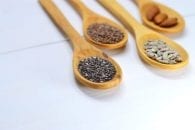Seeds have nutritional profiles similar to nuts, because, after all, nuts are seeds. One ounce of hulled sunflower seeds (one medium-size handful) offers:
• 165 calories
• 5.5 grams of protein
• 14 grams of fat (90 percent saturated)
• 3 grams of fiber
• 2 milligrams of niacin (10 percent of the DV)
• 67 milligrams of folic acid (17 percent of the DV)
• 20 milligrams of calcium
• 1.5 milligrams of zinc (10 percent of the DV)
• 1 milligram of iron
• 14 milligrams of vitamin E (50 percent of the DV)
• 78 mcg. of selenium (there is some evidence that 100 micrograms a day of selenium may reduce the risk of cancer)
NUTRITIP: Soak Your Seeds
Soaking seeds and nuts in distilled water overnight makes them easier to digest.
Sesame seeds have a similar nutritional profile to sunflower seeds, but these tiny decorative seeds supply slightly more fiber, and twice as much calcium, zinc, and iron.
Of all the seeds and nuts, pumpkin seeds contain the most iron, packing a blood-building four milligrams per ounce (six times more iron than in an ounce of beef). Yet, pumpkin seeds contain less vitamin E, calcium, folic acid, niacin, and fiber than sunflower or sesame seeds.
NUTRITIP: Grind Your Seeds
Because sesame seeds are so small, you are unlikely to chew them and break down the seeds to release the nutrients. As a result, the seeds pass through the intestines undigested. To release all the good nutrients from these power- packed little seeds, first grind them into a meal, and then sprinkle them on salads.

